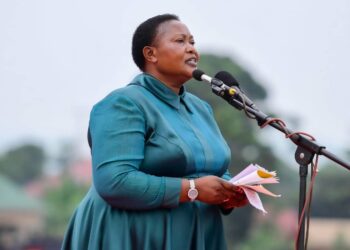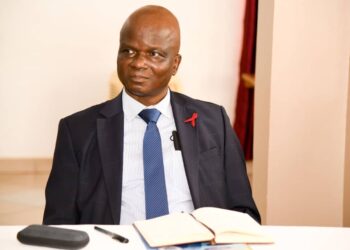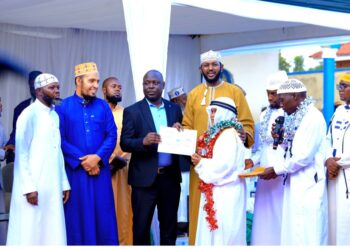By Mike Ssegawa
It was a meeting so full of life. When I set to meet with Ms Namusoke Asia Mbajja, the director of PINA Uganda, I didn’t really know what to expect. Colleagues had for several months told me to meet a woman who is making a difference in the lives of youngsters born with HIV.
For this meeting, she turned up with two beautiful twins. It was actually a birthday for Robinah Babirye and Eva Nakato, some of the children who have benefitted from her counseling and mentorship. They were turning 25, and were born with HIV.
Over a pizza lunch, we spoke about what it means growing up with HIV.
“I have gone through all kinds of stigma. I even stopped going to school for a week. People called me names. I was assured I cannot do anything for myself,” Babirye, a bubbly 25-year-old, told me. She says, “You are judged. No one believes you are in your 20s and were born with HIV. Everyone says you are a prostitute, and a killer.”
As Babirye poured her heart out, her sister, Nakato, kept smiling, only adding a word when she has to. She is the opposite of her sister.
“When you are a teenager with HIV, you lose so many friends. Yet this is a time you need several shoulders to lean on, and people who understand you, not judging or condemning you,” Nakato said after Babirye told stories of friends talking ill about her behind her back.

Babirye and Nakato might have experienced the burden of growing up knowing they are HIV positive. However, they can afford to laugh about their story, as they narrate what they have gone through to be where they are. Today they are going places, attending international conferences, inspiring thousands with stories of how they have taken their ARVs which has kept them alive and healthy.
As we met at a restaurant in Centenary Park, Kampala, the two girls were preparing for a trip to Amsterdam in the Netherlands. But they have been to South Africa, USA, Australia, among other countries.
The twins are now some of the most sought after HIV ambassadors, speaking or performing at global conferences, thanks to the intervention by one woman, Namusoke Asia Mbajja.
They have managed to turn their tears into joy.
“We shall live to see the cure,” Babirye whispers, before we winded up the interview. And she means it. She is a very determined person.

The twins’ story is intertwined with that of their mentor, Asia. She was employed at the Joint Clinic Research Centre (JCRC) working on interventions. JCRC is a medical research institution in Uganda, specializing in HIV/AIDS treatment and management. However, more often she got involved in counseling HIV positive people and her office often had long lines of people waiting to share with her, their challenges as they took ARV drugs.
The stories and experiences Asia heard forced her to resign her job to start an individual intervention which she believed could save lives, something she believes she was not achieving at her day job. That was the birth of People in Need Agency (PINA).
“Children on ARVs were not taking their drugs,” she recalls. However, not taking drugs has “serious repercussions”.
In 2008, Asia identified four needy children. “They had given up on life. They wanted to die,” she says.
“I would meet with them. They were waiting for their final hour. I started with talking to them about taking their ARVs as prescribed. One day at time, they changed their attitude towards ARVs. They regained their health.”

It is these children who started bringing their friends. Their biggest concerns were about feeling neglected.
“They would tell me people at home don’t love me. They want me to die.”
She had to win their confidence one by one. It was during these meetings that she met the twins.
Babirye in particular, had decided to stop taking her drugs. In fact, she failed on the first line of drugs. Babirye wanted to die.
“I started seeing these twins when they were about nine or 10. We had same challenges for almost seven years as long as I was at JCRC. When they were 17 years, I decided to do something about it.”
By the time Asia quit her job, she was already visiting children in their schools and homes to ensure that they were supported.
She would develop treatment plans based on things children loved. For example, she started asking them to take drugs with bread or bananas.

Turning point
As was her routine, Asia went to the home of a 10-year-old first thing one cold morning.
“I found the child at 6am sleeping on the verandah. She told me she wanted wild animals to eat her at night. That is what she thought was her way out of her suffering.”
Asia failed to work that day. She realized she had to do something drastic. “I felt I wasn’t making the difference.”
She resigned in 2012.
She gathered all these children she had been meeting over the years. She knew their stories. Some had been raped by relatives and infected with HIV. Some were born with the disease.
Today, under PINA, Asia is a mother to more than 100 children. There are 45 survivors of sexual violence in Kalangala, 40 children living with HIV are in Ndejje off Entebbe Road and another 26 children of sex workers at Kasenyi landing site.

She wants to take this project to another level, with setting up a mega infrastructure in Kalangala where vulnerable children and girls can be given more attention in terms of life skills and a roof over their heads.
Asia has volunteers such as Babirye and Nakato, young women who have grown up in her hands. They have been empowered to take responsibilities.
“When I see Robinah addressing big conferences as a guest speaker, I feel proud and keep going,” Asia says.
Robinah graduated with a degree in Community based rehabilitation from Kyambogo University while Nakato Eva has also completed her certificate and diploma in Art and Design at Michael Angelo School of Creative Arts Kisubi.
The two are instrumental in the various programs at PINA including mentorship and fundraising programs.
PINA has received support in terms of paying for expenses for international travel for various activities of the organization. The charity has lots of funding gaps and especially that it is Asia and her husband who bankroll most of the activities. They however use music, dance and drama to fundraise and they have the gifted hands of Eva Nakato who is also shooting films to popularize their work as well as producing educative content for vulnerable children.
One of the activities on their desk right now is “Roof and Equip Winnie”. And they are mobilizing funds for it.
Winnie is a girl who was trafficked from Sembabule district. She was sold by her uncle at 11 to another man in exchange for alcohol. The man who took Winnie also sold her to another man who brought the girl to Kalangala. She escaped from this man’s custody and found a centre where girls who survive sexual violence are collected. She is now 19 and in Senior Six.
Babirye will be supporting Winnie in the “Roof and Equip Winnie” campaign to raise funds to build a centre for girls like Winnie. A place they can feel more secure.
“We want this to happen. We should raise the self-esteem of girls who have given up. They need to get involved in their struggle and get something out of their lives. Some of these girls need justice to be served. This centre can foster this process,” says Babirye, adding, at the centre, girls can be rehabilitated and receive justice and mentorship in order to turn their misfortune into something positive.
“They can be advocate for a better life for girls, change agents in their communities and ambassadors for education, life skills, and industry.” Babirye adds. Nakato adds, for them they have given their young lives to advocacy. They have to see a better life for other children.
“We are growing our network. Everyone can use what they think is weakness, and turn it into a strength.”
When one is empowered, it is RobinahBabirye who puts it better using her own example, “I am loud, but for a good reason.”
This is what it is called to be a voice for voiceless. It is what Asia has been doing for the young girls she has motivated to take their drugs, and given them a chance to education. It is what her mentees in Babirye and Nakato are giving many more girls who are now coming out to declare their HIV status. Or even getting the courage to test to know where they stand.
“We are here to support one another,” Asia said.
Do you have a story in your community or an opinion to share with us: Email us at editorial@watchdoguganda.com











